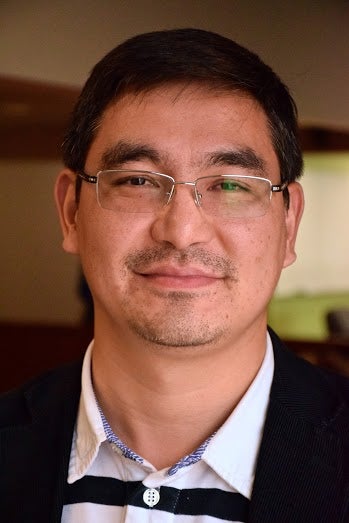Fall 2022: Dunni Ojumu, BA Candidate
 “I am researching the harmful effects of social media on adolescent mental health with a team of public health and legal researchers. As an undergraduate, new to public health research, I am grateful that STRIPED has given me this opportunity like no other to advocate for the safety and wellness of my peers.”
“I am researching the harmful effects of social media on adolescent mental health with a team of public health and legal researchers. As an undergraduate, new to public health research, I am grateful that STRIPED has given me this opportunity like no other to advocate for the safety and wellness of my peers.”
Fall 2022: Destiny Jackson, PhD Candidate
 “Through STRIPED, I am working with incredible mentors to evaluate inequities in harmful “wellness” supplements. Thanks to STRIPED, I have had unparalleled exposure to eating disorder research and have learned how I can leverage equity-focused research to drive policy solutions. I feel empowered to make further contributions to this research area.”
“Through STRIPED, I am working with incredible mentors to evaluate inequities in harmful “wellness” supplements. Thanks to STRIPED, I have had unparalleled exposure to eating disorder research and have learned how I can leverage equity-focused research to drive policy solutions. I feel empowered to make further contributions to this research area.”
Fall 2021: Rachel Plummer, BA
 “With the invaluable guidance of STRIPED mentors, I have been researching weight discrimination and working on advocacy efforts for the passage of legislation to make body size discrimination illegal in Massachusetts. I have learned so much from the STRIPED team and am grateful that they have empowered me to be an advocate for progressive legislation.” – Rachel Plummer
“With the invaluable guidance of STRIPED mentors, I have been researching weight discrimination and working on advocacy efforts for the passage of legislation to make body size discrimination illegal in Massachusetts. I have learned so much from the STRIPED team and am grateful that they have empowered me to be an advocate for progressive legislation.” – Rachel Plummer
Rachel Plummer is a Master of Public Health student in the Department of Nutrition at Harvard T. H. Chan School of Public Health. As a STRIPED trainee mentored by Drs. S. Bryn Austin and Amanda Raffoul, Rachel has been working on advocacy efforts for bills S.1127 and H.1822. If passed, these bills would ban body size discrimination in Massachusetts by making height and weight protected identities. Rachel was shocked to learn that it is completely legal to discriminate against someone because of their weight in employment, housing, education, and all areas of life. These bills would be a huge step in the right direction towards eliminating weight discrimination and stigma, which are incredibly common for folks in larger bodies.
Rachel completed her undergraduate degree at William and Mary, where she studied psychology. Her interests focus on policy and systems-level changes to prevent eating disorders, poor body image, and weight stigma and promote healthy, safe, inclusive environments.
Spring 2019: Kendall Sharp, BA
 “STRIPED is forging new frontiers in addressing the dangers of dietary supplements for weight loss. I am working on a first-of-its-kind content analysis of social media data to analyze how people discuss and use these dangerous products. I’m excited to be on the frontlines of research that will pave the way for public health surveillance and policy changes to keep kids safe!” – Kendall Sharp
“STRIPED is forging new frontiers in addressing the dangers of dietary supplements for weight loss. I am working on a first-of-its-kind content analysis of social media data to analyze how people discuss and use these dangerous products. I’m excited to be on the frontlines of research that will pave the way for public health surveillance and policy changes to keep kids safe!” – Kendall Sharp
STRIPED Trainee, Kendall Sharp, is a Master’s student in the Department of Social and Behavioral Sciences, Harvard T.H. Chan School of Public Health. She is currently working on research with STRIPED Director Bryn Austin. Kendall’s research titled, “Social Media Mapping of Consumers’ Informal Communications about Weight-Loss Supplements” examines how Reddit users discuss weight-loss supplements.
Fall 2018: Kuanysh Yergaliyev, MD, MPH, DrPH
 “STRIPED gave me the opportunity to engage in policy translation research and public health advocacy to protect youth from dangerous dietary supplements. I had the unique experience of hearing the health concerns of local communities and converting this knowledge into tailored advocacy strategies. I look forward to applying these skills in serving my community in Kazakhstan.” – Kuanysh Yergaliyev
“STRIPED gave me the opportunity to engage in policy translation research and public health advocacy to protect youth from dangerous dietary supplements. I had the unique experience of hearing the health concerns of local communities and converting this knowledge into tailored advocacy strategies. I look forward to applying these skills in serving my community in Kazakhstan.” – Kuanysh Yergaliyev
Dr. Kuanysh Yergaliyev graduated from Kazakh National Medical University in Almaty (Kazakhstan). He received a Master of Public Health (2009) degree from Tulane University School of Public Health and Doctor of Public Health (2019) from Harvard T.H.Chan School of Public Health. Prior to Harvard University, Kuanysh Yergaliyev worked at the Department of Integrated Academic Health Systems, in Nazarbayev University (Kazakhstan), and held various managerial positions at the Ministry of Health of the Republic of Kazakhstan. His fields of expertise are strengthening health systems in middle income countries, evidence-based decision-making, health behavior change programs, health policy advocacy for children and adolescent health, and using qualitative and mixed research methods for health policy research. Kuanysh is a cofounder and current President of Harvard Chan Qualitative Methods Student Club and a cofounder and current President of Miras Boston Kazakh Cultural Foundation, which aims to meet cultural and social needs of Kazakh people in Greater Boston Area.
Spring 2017: Ryan Heurto
“I have witnessed the impact of marketing on marginalized communities and am frustrated that many healthcare and public health practitioners blame the individualrather than acknowledge structural issues influencing an individual’s health behaviors. Increasing corporate social responsibility is a way to address health inequities.” -Ryan Huerto
Ryan Huerto was a master’s degree candidate in the Department of Social and Behavioral Sciences at the Harvard Chan School. Under the guidance of STRIPED Director Dr. S. Bryn Austin, Ryan worked with co-trainee Anvita Kulkarni to develop a strategic plan to motivate voluntary corporate actions to address the sale of harmful dietary supplements marketed for weight loss and muscle building in pharmacies and supermarkets. The need for such a plan is crucial in light of poor FDA regulation and frequent abuse of dietary supplements for weight loss and muscle building purposes, especially by adolescents with eating disorders and body image issues. Ryan conducted field visits, literature reviews, and key informant interviews to inform this vital plan for increasing corporate social responsibility in the dietary supplement industry.
Prior to attending the Harvard Chan School, Ryan was a 3rd year medical student at the University of California, San Diego. Before beginning medical school, Ryan completed a master’s of education at Loyola Marymount University and worked as a high school science teacher in Los Angeles.
Spring 2017: Amy Brunner
 “My project is an opportunity to expand the reach and impact of the STRIPED teaching cases, which are an incredibly valuable learning resource for public health students and professionals. As a student, it has been exciting to explore the world of online learning and how it can apply to eating disorders prevention.” -Amy Brunner
“My project is an opportunity to expand the reach and impact of the STRIPED teaching cases, which are an incredibly valuable learning resource for public health students and professionals. As a student, it has been exciting to explore the world of online learning and how it can apply to eating disorders prevention.” -Amy Brunner
Amy Brunner, a former master’s degree candidate in the Technology, Innovation and Education program at the Harvard Graduate School of Education, worked with STRIPED Director Dr. S. Bryn Austin and STRIPED faculty Dr. Holly Gooding to develop a prototype for converting the STRIPED teaching cases into e-learning modules. This important work will increase the accessibility of STRIPED teaching cases across different educational settings in order to engage more students in team-based problem-solving of current, real-world dilemmas in eating disorders prevention. As part of the project, Amy gained experience in assessing the options for online learning platforms, creating designs for a sample case, and writing a strategic plan to lay down the foundation for the project moving forward.
Amy also has a background in teaching. Prior to enrolling at the Harvard Graduate School of Education, Amy worked with the Urban Education Institute as a Math Tutoring Fellow. Through the Urban Education Institute, Amy tutored 9th and 10th grade boys in algebra and geometry in two Chicago public high schools. Before her time in Chicago, Amy spent a year teaching English in Vladimir, Russia.
Spring 2014: Hyungi LeAnn Noh
 “My interest in body image stems from my experience growing up in a diet-obsessed culture and seeing the soaring rate of cosmetic surgery at home in South Korea. We can’t just watch this happen. We have to come up with preventive policies for eating disorders and body image problems, and that’s what I intend to do.” -LeAnn Noh
“My interest in body image stems from my experience growing up in a diet-obsessed culture and seeing the soaring rate of cosmetic surgery at home in South Korea. We can’t just watch this happen. We have to come up with preventive policies for eating disorders and body image problems, and that’s what I intend to do.” -LeAnn Noh
Hyungi LeAnn Noh is a master’s degree candidate in the Department of Social and Behavioral Sciences at the Harvard Chan School. Under the guidance of STRIPED Collaborating Mentor Mihail Samnaliev, PhD, LeAnn is developing new skills in economic analysis focusing on the economic burden of eating disorders. In addition, LeAnn is helping to expand our STRIPED library of teaching cases by assisting in the creation of our new teaching case on the principles of cost-effectiveness analysis. In another project, LeAnn worked with STRIPED Collaborating Mentor Davene Wright, PhD, to help conduct a cost-effectiveness evaluation of school-based eating disorders screening.In addition to her projects with STRIPED, LeAnn is also a co-president of the Harvard Chan School Student Society for Refugee Health. The group aims to inspire conversations and actions regarding displaced people from both man-made and natural disasters. LeAnn is currently conducting a qualitative study with North Korean refugees in South Korea. She is also the Harvard Chan School liaison for the Harvard Law and International Development Society. Prior to coming to the Harvard Chan School, LeAnn worked as a journalist covering healthcare in Seoul, South Korea, and was a healthcare policy analyst in San Francisco. LeAnn studied economics and arts at Dartmouth College.
Fall 2013: Grant Barbosa
 “Supplements vary greatly – some are useful, some are harmful, many are ineffective. Many weight loss and muscle building supplements promote unhealthy focus on body image, especially on body types that may prioritize aesthetics over health. Our research should help address the potential damage that they can cause.” –Grant
“Supplements vary greatly – some are useful, some are harmful, many are ineffective. Many weight loss and muscle building supplements promote unhealthy focus on body image, especially on body types that may prioritize aesthetics over health. Our research should help address the potential damage that they can cause.” –Grant
Grant Barbosa is a law student and Presidential Scholar in his final year at Harvard Law School. Grant joins the STRIPED team to perform legal research on a new STRIPED study exploring regulation of weight loss and muscle building supplements and the health risks they can pose. Throughout his academic career, Grant has focused on the intersection of public health and food law and policy. In previous research, Grant has worked with the food assistance team at the Center on Budget and Policy Priorities to examine issues related to the Supplemental Nutrition Assistance Program (SNAP) and School Lunches.
Grant is currently involved at Harvard Law School’s Food Law and Policy Clinic as a clinical student where he is drafting model legislation to help reduce food waste. Previously, Grant was involved with the school’s Health Law and Policy Clinic where he helped pilot Providing Access to Healthy Solutions (PATHS), an initiative to improve health outcomes by eliminating barriers to care for patients with type 2 diabetes through state-level policy recommendations.
Spring 2013: Emily Kroshus, MPH
“Sports participation can have so many health, social, and psychological benefits, but in some sports female athletes are at increased risk for disordered eating, often due to pressures within the athletic environment. Sports teams have been studied as sources of negative body and eating-related pressure, but have not been studied as potential sources of positive pressure to behave in healthy ways—something I hope to change with my dissertation work. My goals are to understand risk and protective factors within the team environment and ultimately develop and evaluate programs aimed at enhancing the positive consequences of sport participation.” -Emily
participation can have so many health, social, and psychological benefits, but in some sports female athletes are at increased risk for disordered eating, often due to pressures within the athletic environment. Sports teams have been studied as sources of negative body and eating-related pressure, but have not been studied as potential sources of positive pressure to behave in healthy ways—something I hope to change with my dissertation work. My goals are to understand risk and protective factors within the team environment and ultimately develop and evaluate programs aimed at enhancing the positive consequences of sport participation.” -Emily
Emily Kroshus is a doctoral candidate in the Department of Social and Behavioral Sciences at the Harvard Chan School. Her doctoral dissertation is focused on evaluating how a positive, strength-based approach can help prevent disordered eating among female athletes and how teams can promote these strengths. Previous research on the “contagion” of eating-related attitudes and behaviors among groups of females has focused on negative attitudes and pathological behaviors. Her work aims to bring a positive orientation to the conversation about the prevention of disordered eating among female athletes.
Emily is a collaborator with the Female Athlete Triad Project, helping to develop and evaluate educational materials about the Female Athlete Triad for high school coaches in the state of New York. She is also leading efforts to evaluate the implementation of a mindfulness-based eating disorder prevention program in South Carolina. For her other work on health in the sports context, she is the 2012-13 recipient of the NCAA’s Graduate Student Research Grant for her research evaluating collegiate concussion education programs.
Fall 2012: Bernice Garnett, MS
 “Weight based discrimination and bullying are common in our society and, sadly, often accepted as the norm. But for youth, they can have serious consequences on their health, well-being, and academic achievement. My goal is to help create and maintain safe spaces for youth that foster emotional and physical well-being, healthy relationships, and academic excellence. To do this, we need better evidence-driven policies and programs for youth. My hope is that my research will help us develop these much-needed interventions to eliminate discrimination and bullying.” -Bernice
“Weight based discrimination and bullying are common in our society and, sadly, often accepted as the norm. But for youth, they can have serious consequences on their health, well-being, and academic achievement. My goal is to help create and maintain safe spaces for youth that foster emotional and physical well-being, healthy relationships, and academic excellence. To do this, we need better evidence-driven policies and programs for youth. My hope is that my research will help us develop these much-needed interventions to eliminate discrimination and bullying.” -Bernice
Bernice Garnett is a doctoral candidate beginning her last year in the program in the Department of Social and Behavioral Sciences at the Harvard Chan School. With a dual concentration in health communication and maternal and child health, she is gaining a unique blend of expertise to bring to eating disorders prevention. Bernice’s doctoral dissertation focuses on the intersections of multiple forms of discrimination among ethnically diverse adolescents, highlighting the consequences of weight-based discrimination and bullying for the mental and physical health of teens. In 2011, she was honored for this work with the top prize for student research from the Society for African American Public Health Issues.
In a STRIPED research project, Bernice is leading the first-ever evaluation study of Fat Talk Free Week, a unique social marketing campaign from the Delta Delta Delta national sorority to increase awareness of the harmful effects fat talk and ultimately to encourage more constructive and body-positive and affirming ways for girls and women to talk about their bodies. In addition to her dissertation research and STRIPED projects, Bernice is dedicated to promoting community-based participatory research and has been managing a trail-blazing collaborative effort among researchers, community members, educators, and policymakers in Cambridge, MA, to better understand and address the persistent racial and ethnic disparities in excess weight gain affecting the city’s youth.
Summer 2012: STRIPED Team
This past year, we celebrated the graduation of our first doctoral-level trainee, Monica Wang, and three master’s degree trainees – Rob Buelow, Elisabeth Malin, and Boram Seo — and cheered on Leah Hawkins, currently a medical student at Harvard. Leah finished her training at the Harvard Chan School and will earn her MD/MPH next year. We are also welcoming to STRIPED two new trainees, Harvard Chan School doctoral student Allegra Gordon and Harvard Law School student Katherine Cohen. In addition, we are delighted to welcome Dr. Jerel Calzo, our newest STRIPED faculty. Jerel, who was our first postdoctoral fellow with the initiative, brings an invaluable combination of stellar teaching and mentoring skills and a unique research focus on gender, masculinity, and eating disorders. Jerel is sure to bring important new perspectives and opportunities for our trainees. Welcome, Jerel!
I am especially grateful to both our founding and new funders, who have made it possible for us not only to expand our cadre of outstanding trainees and faculty, but also to offer new opportunities through our initiative. Here are some of the highlights from this past year:
- For the first time at the Harvard School of Public Health, we awarded in 2011 two $5000 dissertation research awards and are now preparing to award two more for the 2012-13 academic year.
- We sponsored a STRIPED practicum for a trainee to organize a legislative briefing at the Massachusetts State House on eating disorders screening in schools. Health policy student Elisabeth Malin worked with the National Eating Disorders Association, Massachusetts-based Multiservice Eating Disorders Association, and the office of state Representative Kay Khan on the briefing, which had an excellent turn out from legislators and their staff along with community advocates.
- We carried out the first-ever evaluation of Fat Talk Free Week, a national social media campaign to challenge people, especially girls and women, to interrupt the kinds of body disparaging conversations that are so common. Stay tuned for results from this important evaluation research effort, led by STRIPED trainees Bernice Garnett and Rob Buelow in collaboration with STRIPED International Expert Advisory Panel member Dr. Debra Franko.
- And in our debut in the popular press, the Huffington Post ran a piece on STRIPED and our unique approach to advancing eating disorders prevention.
Check back with us to see what else we have going on for research and practicum opportunities for trainees, recent publications from our team, and lots more.
-S.Bryn Austin, ScD
STRIPED Director
Spring 2012: Rob Buelow, BA
 “It’s no surprise that so many people struggle with some form of disordered eating. We live in a society that bombards us with unrealistic messages and expectations about weight, body image, and beauty. The true challenge for public health is to work upstream to create a culture where people are healthy and happy being themselves.” -Rob
“It’s no surprise that so many people struggle with some form of disordered eating. We live in a society that bombards us with unrealistic messages and expectations about weight, body image, and beauty. The true challenge for public health is to work upstream to create a culture where people are healthy and happy being themselves.” -Rob
Robert Buelow graduated with a Master of Science degree in the Department of Society, Human Development, and Health at the Harvard Chan School. Rob is working with STRIPED as the project manager for a pilot evaluation of Fat Talk Free Week, a national social media campaign to interrupt the constant drone of body-disparaging commentary, especially among girls and women, and encourage more body-positive and constructive conversation. His specific research interest is on the potential role of bystander intervention as a strategy to interrupt and redirect fat talk.
Rob’s professional background is in violence prevention and men’s anti-sexism activism. This year, with the support of the Women, Gender, and Health Interdisciplinary Concentration and the Harvard Chan School Dean Frenk’s Women and Health Initiative, Rob organized the first ever White Ribbon Campaign at the Harvard Chan School as part of an international effort to engage men in ending violence against women. He has worked with the Centers for Disease Control and Prevention as an evaluation consultant for a state-run lead poisoning prevention initiative. Bringing together his role as Vice President of Student Life at the Harvard Chan School and his savvy in health communications and social marketing, Rob masterminded a creative new initiative to reach his fellow students in the most unlikely of places: Stall Stories, a weekly newsletter posted in the bathroom stalls of the school, delivers engaging stories and news about events and opportunities to get involved in the many activities around the school to advance health equity and social change. Rob’s work is featured in the magazine Harvard Public Health (Roeder A. Accentuating the Positive. In The Art of Getting Things Done. Harvard Public Health Spring-Summer 2012).
Postscript: Rob received his MS from the Harvard Chan School in spring 2012.
Fall 2011: Monica L. Wang, MS
 “Advancing programs and policies that prevent DWCB and obesity among youth and address disparities in these outcomes is critical. Public health offers so many opportunities to be a catalyst for change, particularly among underserved populations. My goal is to translate knowledge and research into practice to work towards improved and equitable health outcomes for youth.” -Monica
“Advancing programs and policies that prevent DWCB and obesity among youth and address disparities in these outcomes is critical. Public health offers so many opportunities to be a catalyst for change, particularly among underserved populations. My goal is to translate knowledge and research into practice to work towards improved and equitable health outcomes for youth.” -Monica
Monica L. Wang, MS, a doctoral candidate in the Department of Society, Human Development and Health, was the first trainee with our initiative, joining our team in 2009. With the support of the Ellen Feldberg Gordon Fund for Eating Disorders Research for her doctoral dissertation with the Healthy Choices Study, Monica is examining behavioral, familial, and environmental risk and protective factors for disordered weight control behaviors (DWCB) among youth, exploring racial/ethnic disparities in DWCB among youth, and developing recommendations for programs and policies that address both DWCB and obesity.
Even at this early stage in her career, Monica has a wealth of experience working for health equity and social justice in diverse communities. This past year, Monica was awarded a highly competitive Albert Schweitzer Fellowship to support her work to reduce the amount of sugar-sweetened beverages Boston youth drink. Her project centered on youth-led advocacy in collaboration with Sociedad Latina, a non-profit organization that serves middle and high school youth from Boston Public Schools. In addition, she is a co-instructor with a school-wide public health foundations course at the Harvard Chan School and works as an evaluation consultant with the Centers for Disease Control and Prevention, Department of Housing and Urban Development, and National Coalition to End Childhood Lead Poisoning with the Green and Healthy Homes Initiative. She graduated with her doctor of science degree from the Harvard Chan School this May.
Postscript: Monica received her ScD from the Harvard Chan School in spring 2012.





